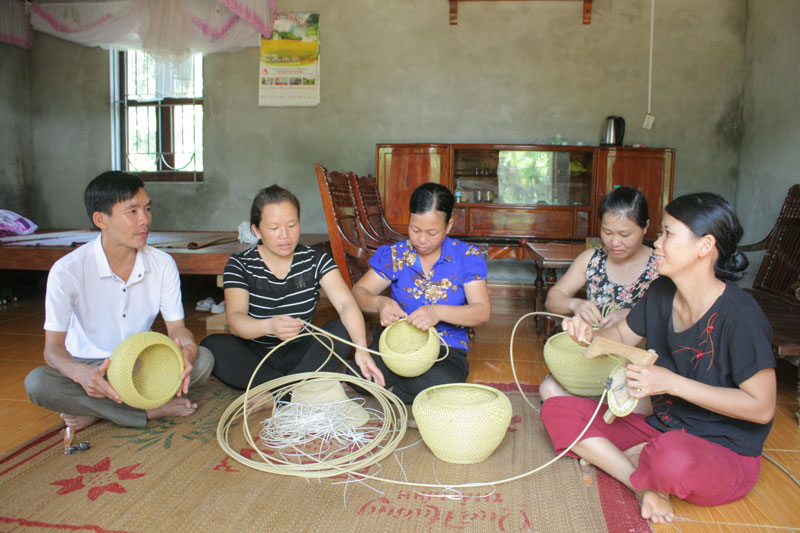
(HBO) – It seems that almost of the local people in Doan Ket residential area, Da Bac town know Ms. Dinh Thi Khanh. Since April 2018, she was mobilized to become the Party Secretary of Tien Phong commune Party Committee - one of the disadvantaged communes of Da Bac upland district. Many people know her not only in her work position but also as a person of merit in bringing down the rattan and bamboo knitting in the lowland to the mountainous district with many difficulties.

The people in Doan Ket, Bo residential area,
Da Bac town (Da Bac) develop rattan and bamboo weaving, contributing to
increase their income.
Mr. Dinh Cong Quang, the Vice Chairman of Da
Bac Farmers' Association, said: The income of 2 million VND may be low for many
people, but for rural women, that is quite high. Particularly in Da Bac town,
the area of agricultural land is small, the service is not developed. Each
household has an average of only 1,000-2,000 square meters of rice, vegetables,
and maize, that can not remain daily life or economic development.
The employment problems for rural people have
long been a problem for the town. The introduction of rattan, bamboo knitting
here is important to help the local people have more jobs and increase their
income. At present, the jobs of bamboo and rattan knitting have grown in the
Doan Ket residential area with 20 households, 15 participating households of Bo
residential area.
Talking to Ms. Dinh Thi Khanh, the Party
Secretary of Tien Phong commune said that: formerly, while working at the District
Education and Training Center, she saw Luong Son district had rattan and bamboo
knitting jobs to create many jobs for laborers. She felt very happy. She and
her husband's sister-in-law went to Phu Vinh, Phu Nghia, Truc Son communes (in
Hanoi) to study. After connecting with the product chains, she used her money
to open classes and hire people in Phu Vinh commune to teach her citizens. In
addition, while working in the Center for Education and Training of the
district, she combined to open 3 vocational training classes, including one for
30 Doi hamlet learners in Hien Luong commune; 1 class of 30 learners in Phu
village, Toan Son commune and 1 class for 20 people with disabilities in the
whole district. Later on, the rattan and bamboo weaving is gradually expanded
to the communes of Hien Luong, Tu Ly, Toan Son and Da Bac town. In order to
have a clue for her exchange of products, Ms. Khanh linked up to establish Tuan
Dat Agricultural Trade Service Cooperative by Mr. Dinh Van Hoang as the
Director. The local people can come directly to the Cooperative to get
materials for home and bring back products to there.
In Lac Thuy district, communes have been succeeded in promoting their One Commune-One Product (OCOP) products while others are still struggling to position their typical farming products in market. Some communes in the district still fail to have their products met OCOP programme’s requirements, while others have seen their certifications expired.
The inspectorate agency of Hoa Binh province has issued Official Dispatch No. 1090/TTr-PCTN to provincial departments, agencies, localities, business associations, enterprises, and investors regarding measures to improve informal component indexes of the Provincial Competitiveness Index (PCI).
Hoa Binh is taking concrete steps to improve its investment environment, with a strong focus on supporting businesses, settling obstacles for strategic investors, and creating opportunities for robust development in the coming years.
Under the blazing early summer sun, the construction site of Nhuan Trach Industrial Park (IP) in Luong Son district is abuzz with activities from dawn to dusk, a testament to the determination of the investor to meet their construction targets on schedule.



